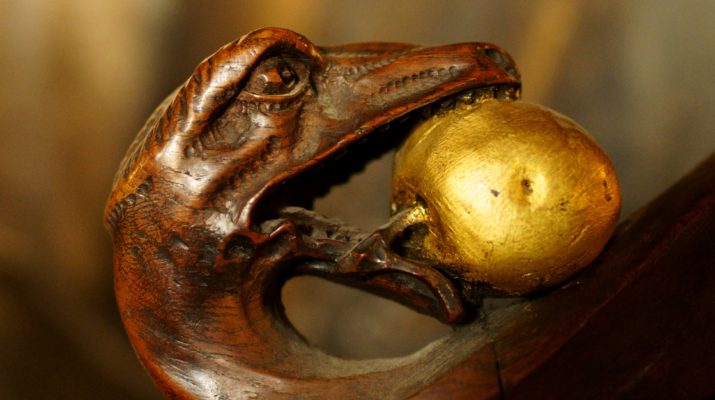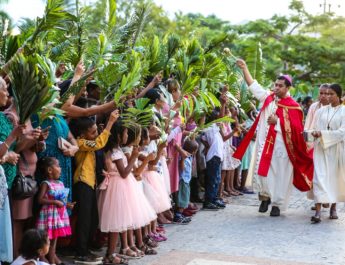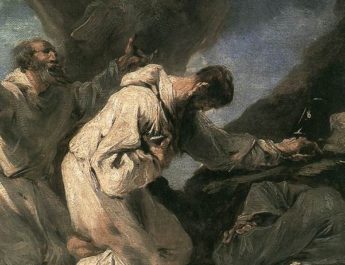Genesis 2:15-17 & 3:1-7
First Sunday in Lent A
BibleHub
2:15 The LordA GodB tookC
Notes on verse 2:15a
A “Lord” = YHVH. From havah (to be, become) or hayah (to come to pass, become, be). This is the name of the God of Israel, the self-existent and eternal one, the tetragrammaton. This pronunciation has been lost to time so “Lord” is generally used in its place.
B “God” = Elohim.
C “took” = laqach. This is to take, accept, carry away, receive. It can also have the sense of take a wife or take in marriage.
the manD and putE him in the gardenF
Notes on verse 2:15b
D “man” = adam. Perhaps from adam (to be red, make ruddy); related to adamah (ground, dirt, earth). This is man, humankind, also Adam’s name. It refers to a human individual or humanity.
E “put” = yanach. Perhaps from the same as nuach (to rest, calm, camp, free, place, remain, satisfy, settle, station, or wait; implies settling down in a literal or figurative sense). This is to lay down, let alone, pacify, cast down, or deposit. It can also mean to allow something or someone to stay.
F “garden” = gan. From ganan (to put a hedge around – generally, protect or defend; to cover or surround). This is a garden in that it is fenced in. It can also be an enclosure.
of EdenG to tillH it and keepI it.
Notes on verse 2:15c
G “Eden” = eden. 16x in OT. Perhaps from the same as eden (luxury, delight, pleasure); from adan (to luxuriate). This is the garden of Eden and also the name of a Levite.
H “till” = abad. This is to work, serve, or compel. It can describe any kind of work or service (including religious devotion). Also, till or cultivate. Used causatively, it can mean to enslave or keep in bondage.
I “keep” = shamar. This is to keep, watch, or preserve. It means to guard something or to protect it as a thorny hedge protects something.
16 And the Lord God commandedJ the man, “You may freely eatK of everyL treeM of the garden,
Notes on verse 2:16
J “commanded” = tsavah. This is to charge, command, order, appoint, or enjoin. This is the root that the Hebrew word for “commandment” comes from (mitsvah).
K “freely eat” = akal + akal. This is to eat, devour, burn up, or otherwise consume. It can be eating in a literal or figurative sense. The word is repeated twice – the first time as an Infinitive Absolute. The Infinitive Absolute serves to emphasize the sentiment of the word. It is rather like Foghorn Leghorn’s speech pattern, “I said, I said.”
L “every” = kol. From kalal (to complete). This is all or every.
M “tree” = ets. Perhaps from atsah (to shut, fasten, firm up, to close one’s eyes). This is tree or other things related to trees like wood, sticks, or stalks. It can also refer to wood products like a plank or staff or gallows. Additionally, this can refer to a carpenter.
17 but of the tree of the knowledgeN of goodO and evilP you shall not eat, for in the dayQ that you eat of it you shall die.”R
Notes on verse 2:17
N “knowledge” = daat. From yada (to know, be aware, see and so understand – includes observation, care, recognition; can also be used as a euphemism). This is knowledge, unawares, cunning, wittingly.
O “good” = tob. From tob (to be pleasing, to be good). This is good, beautiful, pleasant, agreeable, bountiful, at ease. This word is used for goodness as a concept, a good thing, a good person. This can refer to prosperity and welfare as well as joy, kindness, sweetness, and graciousness. So, this is ethically good, but also enjoyably good.
P “evil” = ra’. From ra’a’ (to be evil, bad, afflict; properly, to spoil – to destroy by breaking into pieces; figuratively, to cause something to be worthless; this is bad in a physical, social, or moral sense; that which displeases, to do harm or mischief, to punish or vex). This is bad, disagreeable, that which causes pain, misery, something having little or no value, something that is ethically bad, wicked, injury, calamity. This refers to anything that is not what it ought to be – a natural disaster, a disfigurement, an injury, a sin.
Q “day” = yom. Root may mean being hot. This is the day in a literal or figurative sense. It can also mean birth, age, daylight, continually or other references to time.
R “die” = mut + mut. This is to die in a literal or figurative sense. It can also refer to being a dead body. The word is repeated twice – the first time as an Infinitive Absolute. The Infinitive Absolute serves to emphasize the sentiment of the word. It is rather like Foghorn Leghorn’s speech pattern, “I said, I said.”
3:1 Now the serpentS wasT more craftyU
Notes on verse 3:1a
S “serpent” = nachash. Perhaps from nachash (to practice divination, learn by experience; to hiss as in whispering a spell). This is a serpent or snake.
T “was” = hayah. Related to “Lord” in v2:15. See note A above.
U “crafty” = arum. 11x in OT. From arom (being shrewd or crafty, cunning; properly, being or making bare). This is crafty, shrew, or prudent. It is cunning, but usually in a negative way.
than anyV other wildW animalX that the Lord God had made.Y He said to the woman,Z “AADid God say, ‘You shall not eat from any tree in the garden’?”
Notes on verse 3:1b
V “any” = kol. Same as “every” in v2:16. See note L above.
W “wild” = sadeh. This is literally field, ground, soil, or land. It can be used to mean wild like a wild animal.
X “animal” = chay. From chayah (to live or keep alive literally or figuratively). This is alive, living, lifetime. It can also be used to describe someone’s age. It can refer to animals, plants, water, or a company or congregation of people. It is life in a very broad sense.
Y “made” = asah. This is to make, do, act, appoint, become in many senses.
Z “woman” = ishshah. From ish (man); perhaps from enosh (human, humankind, mortal); from anash (to be weak, sick, or frail). This is woman, wife, or female.
AA {untranslated} = aph. This is also, furthermore, even.
2 The woman said to the serpent, “We may eat of the fruitBB of the trees in the garden, 3 but God said, ‘You shall not eat of the fruit of the tree that is in the middleCC of the garden, nor shall you touchDD it, orEE you shall die.’”
Notes on verses 3:2-3
BB “fruit” = peri. From parah (to bear fruit, grow, be fruitful, increase; bearing fruit in a literal or figurative sense). This is fruit or reward.
CC “middle” = tavek. This is among, middle, in the midst, the center. Perhaps, properly, to sever.
DD “touch” = naga. This is touch, reach, arrive, come near, strike. This is touching for any reason including sexual or violent.
EE “or” = pen. Perhaps from panah (to turn, face, appear). This is lest, if, or.
4 But the serpent said to the woman, “You will not die,FF 5 for God knowsGG that when you eat of it your eyesHH will be opened,II and you will be like God, knowing good and evil.”
Notes on verses 3:4-5
FF “die” = mut + mut. Same as “die” in v2:17. See note R above. The word is repeated twice – the first time as an Infinitive Absolute. The Infinitive Absolute serves to emphasize the sentiment of the word. It is rather like Foghorn Leghorn’s speech pattern, “I said, I said.”
GG “knows” = yada. Related to “knowledge” in v2:17. See note N above.
HH “eyes” = ayin. This is eye in a literal or figurative sense so eye, appearance, favor, or a fountain (the eye of the landscape).
II “opened” = paqach. This is open, as opening one’s senses, particularly eyes. So, figuratively this can refer to being watchful.
6 So when the woman sawJJ that the tree was good for foodKK and that it was a delightLL to the eyes and that the tree was to be desiredMM
Notes on verse 3:6a
JJ “saw” = raah. This is to see in a literal or figurative sense so stare, advise, think, view.
KK “food” = maakal. Related to “freely eat” in v2:16. From akal (see note K above). This is food, something edible.
LL “delight” = taavah. From the same as avah (to desire, crave, wish for, lust after). This is what is desirable, a delight, greedy, satisfaction, a charm.
MM “desired” = chamad. This is to desire or delight in someone or something. It can also mean something that is precious or coveted. So, it can also refer to lust.
to make one wise,NN she took of its fruit and ate, and she alsoOO gavePP some to her husband,QQ who was with her, and he ate.
Notes on verse 3:6b
NN “make…wise” = sakal. This is to consider or be prudent and so it can mean to instruct or be an expert. It can also mean dealing prudently, which implies success and prospering. This verb presumes intelligence of the subject. In one form of the verb, it can mean laying cross-wise.
OO “also” = gam. This is also, moreover, likewise.
PP “gave” = natan. This is to give, put, set, offer. It is to give literally or figuratively.
QQ “husband” = enosh. Related to “woman” in v3:1. See note Z above.
7 Then the eyes of bothRR were opened, and they knew that they were naked,SS and they sewed fig leavesTT togetherUU and made loinclothsVV for themselves.
Notes on verse 3:7
RR “both” = shenayim. From sheni (double, again, another, second); from shanah (to fold, repeat, double, alter, or disguise). This is two, both, second, couple.
SS “naked” = erom. Related to “crafty” in v3:1. 10x in OT. From ur (to be made naked, exposed, or bare) OR from arom (see note U above). This is nakedness or nudity.
TT “leaves” = aleh. 18x in OT. From alah (to go up, climb, to be high; to arise in a literal or figurative sense). This is leaf, branch, or foliage.
UU “sewed…together” = taphar. 4x in OT– including a time to sew in Ecclesiastes 3:7. This is to sew together or women who sew.
VV “loincloths” = chagor. 7x in OT. From chagar (to gird, bind, or arm; using a belt to gather up one’s garment so that it’s easier to run or move quickly). This is a loincloth, belt, or armor.
Image credit: Detail of the pulpit at St. Mary’s Church by Wit Wisz in Krakow.




